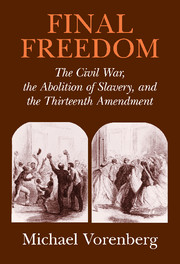Book contents
- Frontmatter
- Contents
- List of Illustrations
- Acknowledgments
- List of Abbreviations
- Introduction
- 1 Slavery's Constitution
- 2 Freedom's Constitution
- 3 Facing Freedom
- 4 Debating Freedom
- 5 The Key Note of Freedom
- 6 The War within a War: Emancipation and the Election of 1864
- 7 A King's Cure
- 8 The Contested Legacy of Constitutional Freedom
- Appendix: Votes on Antislavery Amendment
- Bibliography
- Index
8 - The Contested Legacy of Constitutional Freedom
Published online by Cambridge University Press: 01 September 2009
- Frontmatter
- Contents
- List of Illustrations
- Acknowledgments
- List of Abbreviations
- Introduction
- 1 Slavery's Constitution
- 2 Freedom's Constitution
- 3 Facing Freedom
- 4 Debating Freedom
- 5 The Key Note of Freedom
- 6 The War within a War: Emancipation and the Election of 1864
- 7 A King's Cure
- 8 The Contested Legacy of Constitutional Freedom
- Appendix: Votes on Antislavery Amendment
- Bibliography
- Index
Summary
The Thirteenth Amendment was commemorated before it was even ratified. Requests for official copies of the amendment flooded into Congress right after the measure's adoption. Souvenir collectors asked those who voted for the amendment to sign the duplicates, and the most industrious autograph hunters procured as well the signatures of President Lincoln and Vice-President Hamlin. State legislatures vied to be the first to ratify. Senator Lyman Trumbull and Governor Richard Oglesby of Illinois pressed their state's legislature to ratify at once, even before Secretary of State Seward's official notification arrived. The legislature complied, making Illinois the first state to vote for the amendment and assuring it a prominent place in the emancipation record. Opponents of the amendment also wished to add their distinctive mark. An Ohio state assemblyman proposed that his fellow legislators wear a “badge of mourning” for thirty days to acknowledge this “first step towards a centralized despotism.” Two weeks after the momentous vote in the House of Representatives, in the very chamber where the measure had passed, the New York minister Henry Highland Garnet delivered a rousing address commemorating the amendment – the first speech delivered by an African American in Congress. Garnet, who was there by invitation of President Lincoln, used the occasion to demand equal rights beyond emancipation: “When and where will the demands of the reformers of this and coming ages end? … When emancipation shall be followed by enfranchisement … when there shall be no more class-legislation, and no more trouble concerning the black man and his rights.”
- Type
- Chapter
- Information
- Final FreedomThe Civil War, the Abolition of Slavery, and the Thirteenth Amendment, pp. 211 - 250Publisher: Cambridge University PressPrint publication year: 2001



